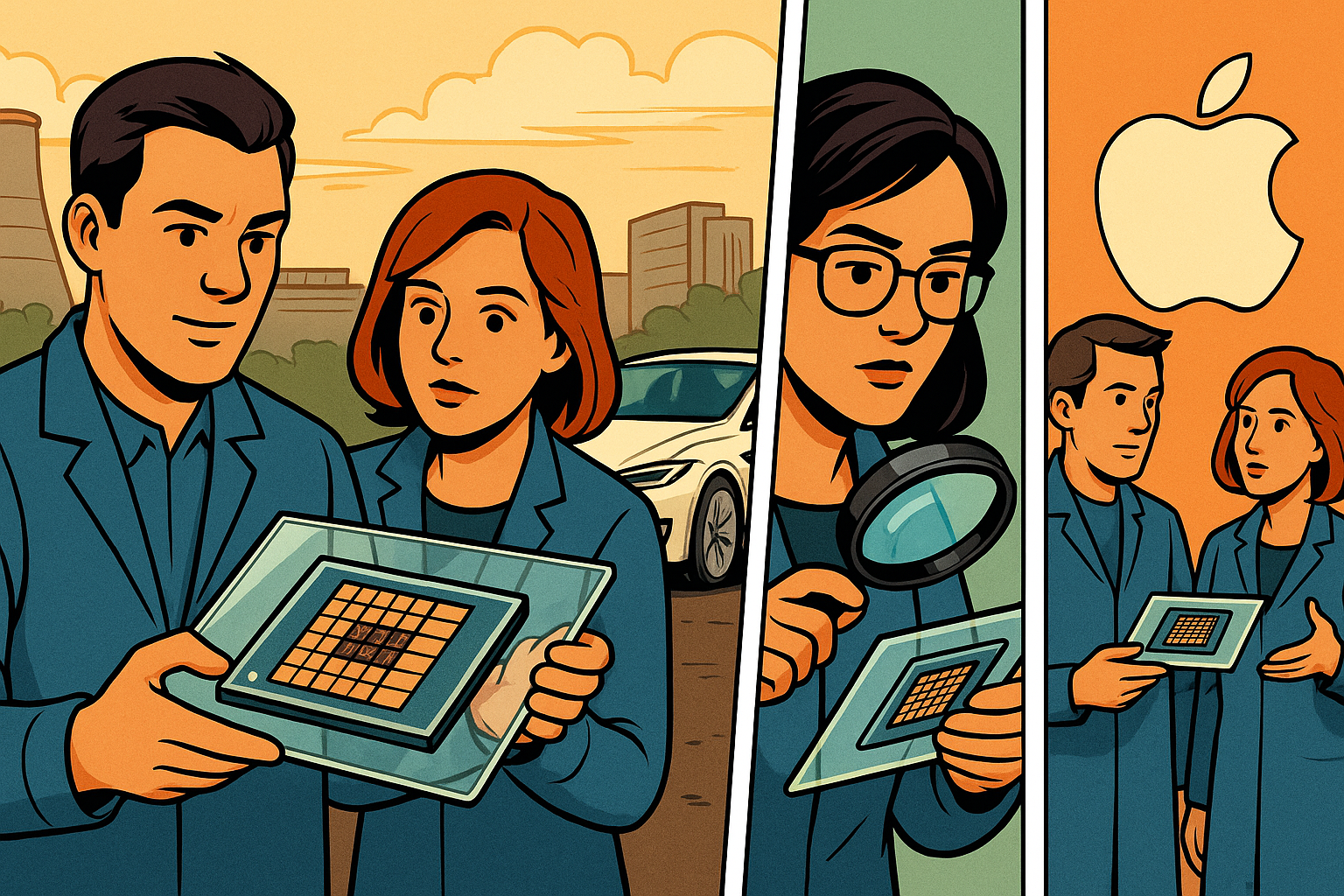Apple & Tesla: Verkennen glass substrates voor chips

For our international clients: a full English version follows after the Dutch text
Volgens mediaberichten onderzoeken Apple en Tesla de inzet van glass substrates in geavanceerde halfgeleider-packaging. Deze technologie kan betere warmteafvoer bieden dan de huidige silicon interposers, die bij grotere AI-chips gevoelig zijn voor vervorming onder hoge temperaturen. Glass substrates worden gezien als een mogelijke nieuwe standaard in chiptechnologie, maar massaproductie is nog niet gerealiseerd.
Technologische voordelen
Glass substrates hebben een lage uitzettingscoëfficiënt en trekken daardoor minder snel krom bij hitte. Dit maakt ze geschikt voor grote en complexe chipformaten zoals die voor AI-servers, datacenters en voertuigen met hoge rekenkracht. Voor Apple kan dit een rol spelen bij het ontwikkelen van efficiëntere AI-hardware en datacenters. Tesla kan deze technologie gebruiken voor chips in zelfrijdende systemen en energieplatforms, waar hitte en stabiliteit cruciale factoren zijn.
Mogelijke profiteurs
De mogelijke verschuiving richting glass substrates kan kansen bieden voor meerdere bedrijven in de keten. Spelers als Samsung Electro-Mechanics, LG Innotek, Ibiden en Shinko Electric Industries investeren al geruime tijd in deze ontwikkeling. Daarnaast beschikken glasbedrijven als Corning, SCHOTT, Nippon Electric Glass en NGK Insulators over kennis die hen in een sterke positie kan brengen. Europese producent AT&S en Aziatische spelers als Toppan en Unimicron kunnen eveneens profiteren als de technologie richting opschaling gaat.
Outlook
Hoewel glass substrates nog niet noodzakelijk zijn voor bestaande chipproductie, onderstreept de interesse van Apple en Tesla dat er serieus wordt gekeken naar alternatieven voor silicon interposers. Dit kan de komende jaren leiden tot een verschuiving in marktaandelen binnen de halfgeleiderindustrie. Voor beleggers kan dit thema zich ontwikkelen tot een structurele trend naast andere drijvers zoals high bandwidth memory en advanced packaging.
Conclusie
De geruchten rond Apple en Tesla zijn nog geen bevestiging van directe toepassing, maar tonen wel aan dat glass substrates steeds meer aandacht krijgen. Voor bedrijven die de productie op schaal kunnen realiseren, kan dit een structurele kans zijn. Voor beleggers is dit nu vooral een thematische ontwikkeling om nauwlettend te volgen, omdat een doorbraak de waardeverhoudingen in de toeleveringsketen kan veranderen.
🔵 English version
Apple and Tesla explore glass substrates for chips
Media reports suggest that Apple and Tesla are exploring the use of glass substrates in advanced semiconductor packaging. The technology offers superior thermal performance compared to traditional silicon interposers, which struggle with warping under high temperatures in large AI chips. While glass substrates are seen as a potential breakthrough, volume manufacturing is not yet in place.
Technological edge
Glass substrates feature a lower coefficient of thermal expansion, which reduces warping and improves stability under heat stress. This makes them suitable for large-scale, high-performance chips in AI servers, datacenters, and advanced automotive platforms. For Apple, the move could improve efficiency in AI hardware and datacenter infrastructure. For Tesla, it could enhance the reliability and compute power required for autonomous driving and energy systems.
Potential beneficiaries
A shift toward glass substrates could open the door for suppliers already investing in the technology. Samsung Electro-Mechanics, LG Innotek, Ibiden, and Shinko Electric Industries are among the early movers. Glass specialists such as Corning, SCHOTT, Nippon Electric Glass, and NGK Insulators are also well-positioned. In addition, European player AT&S and Asian packaging names like Toppan and Unimicron could benefit as the technology scales.
Market outlook
Glass substrates are not yet essential for current chip production, but Apple and Tesla’s interest signals that the industry is preparing for alternatives to silicon interposers. Over the medium to long term, this could reshape market shares in advanced packaging. For investors, the theme may develop into a structural catalyst alongside high bandwidth memory and other packaging innovations.
Conclusion
While still at the rumor stage, Apple and Tesla’s reported interest highlights growing momentum behind glass substrates. Companies capable of scaling production may capture significant upside if adoption accelerates. For investors, this remains an early-stage but strategically important trend to monitor closely.
Disclaimer Aan de door ons opgestelde informatie kan op geen enkele wijze rechten worden ontleend. Alle door ons verstrekte informatie en analyses zijn geheel vrijblijvend. Alle consequenties van het op welke wijze dan ook toepassen van de informatie blijven volledig voor uw eigen rekening.
Wij aanvaarden geen aansprakelijkheid voor de mogelijke gevolgen of schade die zouden kunnen voortvloeien uit het gebruik van de door ons gepubliceerde informatie. U bent zelf eindverantwoordelijk voor de beslissingen die u neemt met betrekking tot uw beleggingen.




